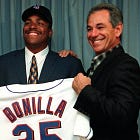Like everyone else in the world, I was expecting Shohei Ohtani’s contract to be huge. And still, I was blown away when it was reported over the weekend that the Dodgers had given Ohtani a 10-year, $700 million deal. That top-line number made it the biggest contract in the history of professional sports, and broke the record for baseball contracts by 60% — Ohtani’s contract was like if you added Alex Rodriguez’s biggest contract to the biggest deal in the history of the sport.
Then, as more information about the deal came out, things got even weirder. Initial reporting had suggested that “a significant amount” of Ohtani’s salary would be deferred, which most people took in stride. It is pretty standard now for big baseball deals to include a lot of deferred money: Mookie Betts’ deal has a lot of deferred money, and Max Scherzer deferred almost half his salary in his contract with the Nationals, etc.
But then it turned out that in this case “a significant amount” meant 97% — next season, Ohtani will be paid only $2 million, or less than Dodgers’ backup catcher Austin Barnes. And Ohtani won’t get a raise for the duration of the contract. It won’t be until 2034, when Ohtani turns 40, that he will start getting the bulk of the money owed to him on the contract: He’ll make $68 million per year from the Dodgers over the following decade.
In some ways, this made the deal more understandable. Based on the way the collective bargaining agreement interprets these deferments, the “present-day value”* of this contract is $460 million, which was roughly in line with what people were expecting for Ohtani’s deal. But it also made the math way more difficult for fans to understand.
*It’s worth pointing out that this number would still make Ohtani the highest paid baseball player ever, both in terms of Average Annual Value and total value of the contract.
Although reporters like Ben Lindbergh, Fabian Ardaya, and Evan Drellich have helped clarify where this valuation comes from, it’s worth stressing that figuring out the “present-day value” of a future payment is not easy or objective. Indeed, financial firms employ armies of Ivy League graduates who are trained to argue about nothing but this, so reasonable people can disagree. In fact, even within baseball there is disagreement: According to Jon Heyman, Ohtani’s salary will be valued at $46 million for the Competitive Balance Tax, but only $28 million when calculating the Qualifying Offer because the two systems use different formulas. So anyone who pretends to know the “actual value” of this deal is lying to you…
And as a result, people did not know how to react to these details. Suddenly, the biggest deal in the history of sports was being referred to as “team-friendly” by ESPN’s Jeff Passan. Kate Feldman, the assistant MLB editor at CBS Sports, said the union should be worried about the contact.
And, of course, fans of other teams were all up in arms about the Dodgers pulling one over on the league…
But I am here to tell you that everyone needs to get a grip. Obviously this is unusual — it was always going to be an unusual contract because Ohtani is such an unusual player — but nobody is getting scammed here. As happens every year on Bobby Bonilla day, people are getting confused about the nature of deferred payments…
For one, deferred money is good, not bad, for players. We know this because, in prior collective bargaining negotiations, it is the OWNERS who have tried to limit deferred compensation, while the union has pushed to keep it unlimited.
There are many reasons why a player might want to defer his salary. In general, deferred salary helps address the lifecycle earnings problem that many pro athletes face. One reason so many former athletes go broke is that they usually experience a sharp drop in their earnings when they retire. By deferring money, athletes can soften this blow. In general, smoothing out your earnings over your life — so that people still have income during periods when they cannot work because they are sick or elderly or children or caring for people who are sick, elderly, or children — is a socialist, pro-labor goal.
Of course, Ohtani is in no danger of going broke, nor is he smoothing out his earnings (he’s actually doing the opposite since he’s going to experience several dramatic changes in his year-to-year salary over the next few decades). In this specific case, much has been made of Ohtani’s desire to make sure the Dodgers have the flexibility to stay competitive while he is on the team — which makes sense, given his experience on the Angels the last six seasons. There are also potential tax savings if he is no longer living in California when the $68 million payments begin.
But a very simple fact is that Ohtani is going to be making a lot of money no matter what. Any way you slice it up, $700 million is a lot of money. So much that normal financial advice doesn’t really apply. If someone asked me to defer 97% of my salary, I would obviously say No; I couldn’t live on the leftover 3%. But for Ohtani, the remaining 3% still puts him in the top 0.1% of earners.
In a follow up to the tweet quoted above, Feldman wrote that you should “never let your money sit in someone else's bank account.” Which is normally sound advice! But when you make ~$70 million per year (plus another $50 million annually in endorsements, if you believe the reporting), then the money has to sit SOMEWHERE. I suppose Ohtani could TRY to spend $100 million every year, in some Brewster’s Millions-style challenge, but that doesn’t seem financially sound either and I’m not sure he could pull that off if he wanted to.
So while letting his employer hold on to the money might seem like Ohtani is doing the Dodgers a favor, it also provides him with some protections. For one, the CBA requires the Dodgers to put that deferred money in escrow. Secondly, the Dodgers are a pretty safe investment. Even in the unlikely event that the team were to file for bankruptcy, his deferred salary would make him a highly protected creditor — A-Rod got his money from the Rangers even after that team went through bankruptcy proceedings.
More to the point — and I mean this in the most socialist way possible — there are more important things than money. Ohtani does not seem to care that much about money. When he initially signed with the Angels, he accepted a way below-market deal, playing for the league minimum so he could pursue his goal of hitting and pitching. Now he values things like winning and staying on the West Coast, and this deal allows him to prioritize both things while still becoming the highest paid professional athlete of all-time.
This is precisely the goal of socialism and strong unions: to allow people to pursue their own individualized happiness, rather than being forced to maximize their own salary at every turn. In other words, the ability to play where you want to play and for the team you want to play for with the teammates you want to play with — those things are valuable too. It’s not just that Ohtani should be allowed to factor those in, but that the ability to factor those in is precisely the advantage of being a high-earner in a strong union.
Part of what I mean when I say that “net worth” is made up is that trying to precisely quantify value beyond a certain point is ridiculous. It involves quantifying or predicting things that simply cannot be quantified or predicted. So yes, the precise value of Ohtani’s ostensibly $700 million contract will depend on things like interest rates and inflation, who owns the Dodgers, and what the tax rate is in 2038. But that’s always true for everyone. It’s just that our capitalist economy puts most workers in such a tenuous position that, “take the money while you can” is almost always the right call for almost everyone.
But Ohtani is not like us. He’s the unicorn. So let him do what he wants. I assure you, he’ll be fine…






